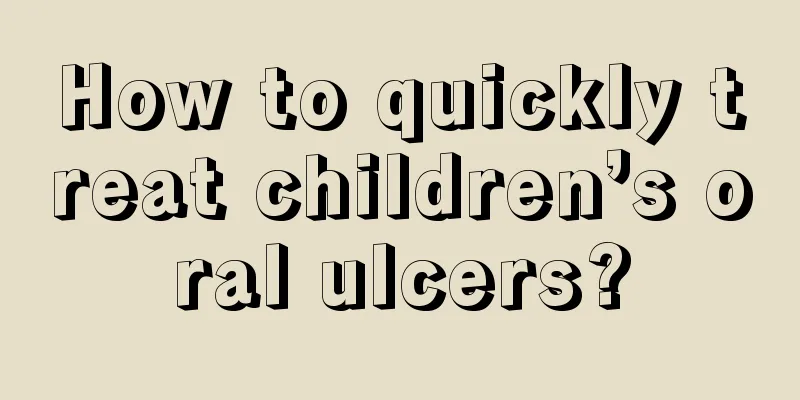If there is a foreign body in the baby's trachea, be careful of the following symptoms

|
The throat of children under five years old is very sensitive and poorly protected. They may accidentally inhale foreign objects into their throats when they laugh or cry, which can cause these problems. Therefore, when parents take care of their children, it is necessary to learn some methods to clean out foreign objects. Children who inhale foreign objects will cry, lose their voice, and gasp, so parents need to provide first aid.
Do not remove foreign objects from the trachea with your hands Foreign bodies in the trachea are typical household emergencies and parents should have first aid knowledge, but it is unlikely to be completely resolved, so parents should be prepared to go to the hospital after it occurs and then take reasonable first aid measures. When a baby chokes on a foreign object in his trachea, parents should not panic. First, they should clear the vomit or food residue in the nasal cavity and mouth, but do not try to dig out the foreign object in the trachea with their hands. It is recommended to try the following three methods to induce the foreign object to be expelled. Abdominal push method : Suitable for patients who are unconscious. The patient lies supinely, with the rescuer facing the patient and straddling the patient's hips; the rescuer places one hand on the other hand, and places the base of the lower hand on the abdomen above the navel below the thorax. The rescuer uses the weight of his body to quickly impact and compress the patient's abdomen, repeating this action until the foreign body is expelled. Patting back method : Suitable for newborns and infants. Lie face down with your chin lifted and your head lower than your torso. Pat the back at the midpoint of the shoulder blade line. Turn over and lie on your back, lowering your torso. Chest impact. Around the abdomen method : The rescuer stands behind the patient and wraps his arms around the patient's waist. Make a fist with one hand and place the thumb side of the fist on the patient's rib cage and abdomen above the navel. Use your other hand to make a fist and thrust it upward quickly to compress the patient's abdomen. Repeat the above steps until the foreign body is expelled. Eat more celery to promote digestion if you swallow foreign objects Babies aged 2-3 years old love to put small parts in their hands, such as chess pieces and coins, into their mouths. When parents find that their child has swallowed a foreign object, if there are no signs of suffocation such as choking, difficulty breathing, or blue lips, they do not need to be too nervous and do not try to spit out the foreign object. Inducing vomiting can easily cause the foreign object to be accidentally inhaled into the trachea and cause suffocation. Generally speaking, after foreign objects enter the digestive tract, most of them, such as chess pieces, coins, buttons, etc., can be excreted from the body along with feces as the gastrointestinal tract moves. To prevent foreign objects from being retained in the digestive tract, you can give your baby more foods rich in crude fiber, such as leeks, celery, etc., to promote the peristalsis of the digestive tract and accelerate the excretion of foreign objects. Most foreign bodies stay in the gastrointestinal tract for no more than two or three days, and a few are not excreted until three or four weeks. Every time the child has a bowel movement, parents should check carefully until they are sure that the foreign body has been expelled. During this period, if the baby vomits blood, has abdominal pain, fever, or passes black loose stools, it means that there is serious digestive tract damage and the baby must go to the hospital immediately. If the foreign body is not expelled after three or four weeks, you should consult a doctor. |
<<: Will a child suffering from purpura have kidney damage when he grows up?
>>: What are the initial symptoms of a dislocated hand in a child?
Recommend
Two-year-old baby walks on tiptoes
A two-year-old baby is just beginning to learn to...
Nursing methods for infants with high muscle tension in their limbs
In fact, in daily life, many people are not caref...
How much weight does a newborn baby gain during the confinement period?
Some physical conditions of children, such as the...
Under what circumstances would a child lose their virginity?
In recent years, there have been more and more ca...
What causes molluscum in children?
Infectious warts in babies are usually caused by ...
How is asthma diagnosed in children?
Recently, many children have developed asthma, wh...
What causes children to often have oral ulcers?
Children often get oral ulcers because of lack of...
What to do if your newborn baby has bleeding belly button
Newly born babies are very weak. Many people pay ...
Is it normal for a 7-year-old to fart frequently?
Farting is a very common phenomenon in our lives....
What to do if your baby has diarrhea at three and a half months old
Babies who are just three and a half months old a...
Baby's nose is blocked and breathing is difficult
When the child is young, the mother wants to keep...
What causes my baby to have recurrent oral ulcers?
Oral ulcers are a disease that can occur in all a...
What to do if your baby has a viral rash
In life, many people do not have a real understan...
What are the symptoms of cerebral palsy in premature babies?
Premature babies are prone to illness, so they us...
A three-year-old boy has delayed language development?
Under normal circumstances, a three-year-old baby...









